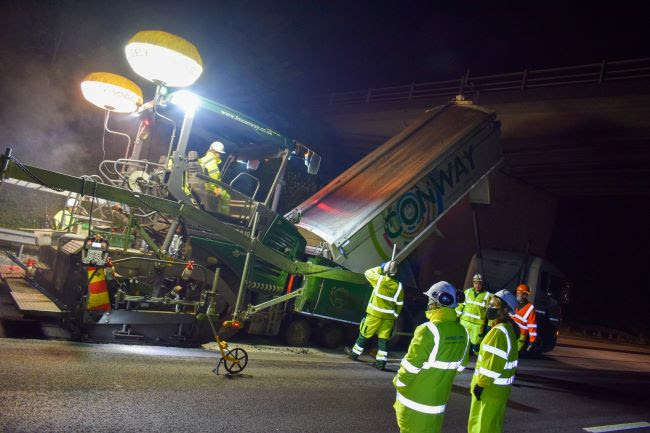Environmentally friendly resurfacing material trialled on M3
A section of the M3 motorway in Hampshire is becoming the first stretch of motorway to use a resurfacing material which contains the highest proportion of recycled asphalt pavement ever used on the strategic road network.
The use of the material – consisting of 70% recycled materials in the base course and 50% in the surface course is a major step towards increasing the use of recycled road surfacing on UK roads, and is the highest level of recycled content ever user used on the strategic road network which could see significant environmental benefits in future road maintenance.
The work is taking place on the northbound M3, and will see the road between junctions 6 (Black Dam Interchange) and 5 (near Hook) resurfaced using the new material.

The recycled materials were taken from a previous resurfacing project on the M3 and were stored, processed and then mixed through a parallel drum asphalt plant, before being laid back onto the M3 as part of the new surface. This reduced the use of both primary aggregates from a quarry and bitumen from a refinery, and gives a new lease of life to materials already used on the motorway. The resurfaced section, when finished, will be monitored regularly to measure the performance of the material. The carbon saving from using recycled materials will provide a vital element towards Highways England’s commitment to reduce carbon and address the challenge of climate change.
This project follows a successful trial by Highways England’s contractor, FM Conway, in September last year on the M25 junctions 25-26 where a road surface with a 50% recycled content was successfully used. Standard practice limits the recycled content of surface courses for motorways and major A roads to just 10%.
The stretch of the M3 currently being re-surfaced covers nearly one mile. Over 1,800 tonnes of recycled material is being used, a reduction of 55% in primary materials which would otherwise have been used. In the future, FM Conway intends to use this new technology to provide a blueprint for future resurfacing and will reap huge environmental benefits for the industry.
Matthew Wayman, Highways England senior pavements advisor, said: “Although it has been common practice for many years to use a degree of recycled asphalt, this is a major step forwards in helping us reduce the amount of new materials needed which in turn significantly reduces our carbon footprint by cutting the emissions and energy required to excavate, manufacture and transport the materials needed to make the material. We were happy to support this exciting opportunity presented by our supply chain colleagues at FM Conway and Kier Highways, and early collaboration gave us confidence that the materials installed would deliver the same level of performance as conventional materials otherwise used on our network.”
“This section of the M3 will be monitored to assess its performance and, if successful, we will move towards routinely using more recycled content in our resurfacing work.”
Mark Flint, FM Conway head of technical, added: “This has been a great collaborative project between FM Conway, Kier and Highways England that demonstrates the value in reusing vital resources on infrastructure projects to help reduce carbon output and ultimately protect our planet.”
Images courtesy of Highways England press office.





































































































































